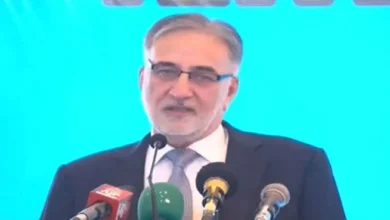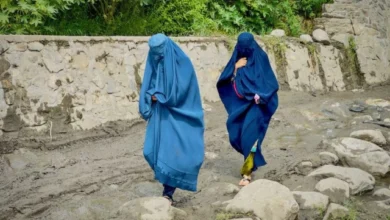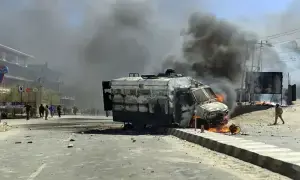Gazans flee after Israel’s ‘impossible’ ultimatum

Flocks of Palestinians fled to southern Gaza in search of refuge on Friday after Israel warned them to evacuate before an expected ground offensive.
Thousands of Gazans were on the move in search of safety, carrying plastic bags of belongings, suitcases on their shoulders and children in their arms.
Some walked while others drove, with belongings strapped to the roofs of their trucks, cars and piled on carts pulled by donkeys.
More than 423,000 people have already fled their homes, according to the United Nations.
UN officials said the Israeli military, whose troops are massing at the border, had told them the evacuation should be carried out “within the next 24 hours”.
AFP correspondents in Gaza said the Israeli military on Friday dropped flyers warning residents to flee “immediately” south of Wadi Gaza.
But the UN described the immediate movement of some 1.1 million people — nearly half of the 2.4 million in the Gaza Strip — as “impossible” and urgently appealed for the order to be rescinded.
UN Secretary General Antonio Guterres appealed for Israel to “avert a humanitarian catastrophe,” after the Israeli army ordered more than one million people to evacuate north Gaza.
“The secretary general and his team have been working the phones. He’s been in constant contact with Israeli authorities, urging them to avert a humanitarian catastrophe,” spokesman Stephane Dujarric told reporters.
Aid agencies have warned mass evacuations would stretch support to the limit, as fuel, food and water dwindled due to an Israeli blockade.
Hospitals are struggling to cope with the dead and wounded from the relentless bombardment, and the health system was already “at a breaking point”, the World Health Organization said.
Ashraf al-Qudra, from the Gaza health ministry, said hospitals were “starting to lose capacity” and medicine was running out.
The UN Relief and Works Agency (UNRWA) for Palestine refugees also announced the transfer of its operations to the south of Gaza, but he said some staff had asked to stay in the north.
“We are not pushing people to move. People have to make their own their own decisions,” he said.
Meanwhile in Geneva, the International Committee of the Red Cross said the unjustifiable “horrific” attacks on Israel could equally not justify “the limitless destruction of Gaza”.
Air strikes continue
Nearly 1,800 Gazans — most of them civilians and including over 580 children — have been killed in Israeli strikes on the densely populated enclave, the health ministry said.
Palestinian Authority prime minister Mohammed Shtayyeh on Friday accused Israel of committing “genocide” in the blockaded Gaza Strip.
“Our people in Gaza are going through genocide, and Gaza has become a disaster area,” Shtayyeh told a press conference in Ramallah.
AFP correspondents said there were “heavy strikes” in the northern Gaza Strip on Friday morning, including Al-Shati refugee camp and Gaza City, primarily targeting residential buildings.
The Hamas media office also reported Israeli air raids on Khan Yunis and Rafah in the south.
The Israeli military said its “fighter jets struck 750 military targets in the northern Gaza Strip overnight” including “residences of senior terrorist operatives used as military command centres”.
White phosphorus
Citing videos as well as interviews with two people who said they witnessed the strikes, Human Rights Watch has accused Israel of using white phosphorus weapons, which can cause serious burns if they hit people.
Amnesty International also said its team has “verified that Israeli military units striking Gaza are equipped with white phosphorus artillery rounds”.
But an Israeli military spokesman said: “We deny those allegations, we have not made use of white phosphorus, not in Gaza and not in Lebanon.”
Phosphorus, a substance that catches fire on contact with the air, is used to create smokescreens to hide troop movements, illuminate the battlefield or destroy buildings by fire.
As an incendiary, it is not covered by the Convention on Chemical Weapons, but it does fall under the 1983 Convention on Certain Conventional Weapons.
Protests across Muslim world
Meanwhile, hundreds of thousands of protesters poured onto the streets of several Muslim capitals on Friday in support of Palestinians.
In Egypt, videos on social media showed hundreds of protesters near Cairo’s Al-Azhar mosque chanting in solidarity with Gaza.
“Arab and Muslim countries have the duty and the responsibility to provide urgent humanitarian aid and help to the Palestinians of Gaza”, the university of Al-Azhar, the highest institution in Sunni Islam, said in a statement.
In Baghdad on Friday, tens of thousands of Iraqis rallied in central Tahrir Square, waving Palestinian flags and burning the Israeli flag while chanting anti-U.S. and anti-Israeli slogans.
In Lebanon, supporters of Iran-backed Hezbollah rallied in the southern suburbs of Beirut in support of Palestinians.
In Turkey, crowds gathered outside mosques chanting against Israel and saluting Hamas. In the southeastern city of Diyarbakir, 46-year-old business owner Mikail Bakan said: “All the Muslim world needs to be one against Israel.”



